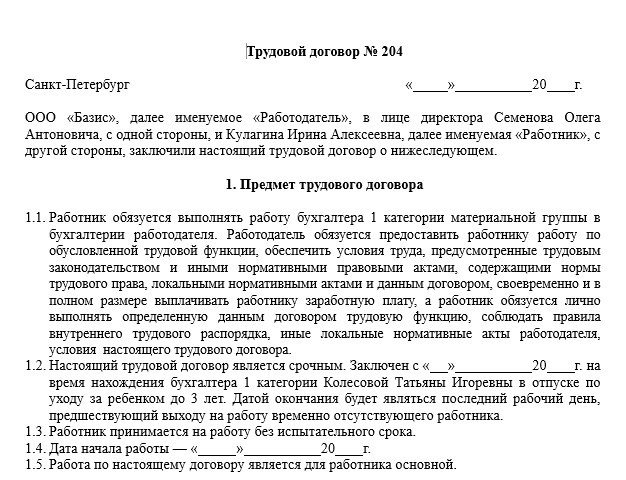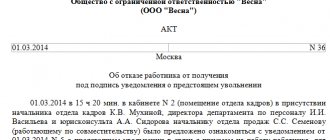Employment contract and everything about it
What is an employment contract?
An employment contract is perhaps the main document in the working relationship between the parties. It is he who is intended to regulate such issues as: length of working hours, vacation time, provision of benefits and additional compensation to the employee. In addition, the contract performs a regulatory function in the event of labor disputes.
It is based on the provisions of this document that the dispute commission or other bodies make decisions when resolving conflict situations between participants.
An employment contract is signed immediately before the start of the employment relationship. With the end of the relationship, it is terminated by an appropriate order.
It is on the basis of this document and the orders of the manager that notes are entered into the work book. In terms of its duration, the contract can be either fixed-term or without a specific duration.
A fixed-term agreement implies the performance of labor duties for a certain period of time - a month, six months, a year, and so on.
An open-ended contract is a document without a validity period and is terminated only in the event of a party’s initiative or other circumstances in which continued cooperation is impossible.
When can a fixed-term contract be concluded?
Labor legislation strictly regulates the circumstances in which management must offer a new employee to enter into an employment contract with the company, the duration of which is limited to a temporary period. These conditions are specified in Art. 59 Labor Code of the Russian Federation. These include:
- temporary absence of an employee from his workplace. But on the condition that this job will be retained by him, in accordance with current legislation. The most common case is maternity leave. For example, one employee went on maternity leave, and another was temporarily hired in her place. When the maternity leave, she will return to her workplace, and the “replacement” can be fired or accepted on a permanent basis,
- seasonal and temporary work, the completion of which will not take more than 2 months,
- sending an employee abroad to perform work duties,
- the need of the enterprise for expansion, reconstruction or modernization of equipment or operating facilities, provided that this work will be carried out within a year,
- hiring an employee for a company that was originally created for certain purposes and for a certain period of time,
- hiring a new employee to perform a specific task, while the deadline for completion and the task itself must be specified in the “body” of the contract,
- internship,
- other cases prescribed in Art. 59 Labor Code of the Russian Federation.
If an agreement between the parties is concluded for an indefinite period, then specific circumstances are not required.
Open-ended agreement
An open-ended employment contract implies a relationship without a specific period of validity; in particular, such relationships can be terminated at the initiative of the parties or by decision of a judicial authority.
An open-ended contract, just like a fixed-term one, regulates for the employee and manager not only their rights and powers in labor relations, but also guarantees for the provision of social opportunities. The validity date of such an agreement is not established.
Most often, an open-ended contract is concluded with subordinates at a permanent place of work, when working non-seasonally, that is, for a long time, and in all other cases when concluding a fixed-term agreement is inappropriate.
The main differences between a fixed-term and indefinite employment contract
A fixed-term and an open-ended contract differ from each other in several respects. This:
- time period,
- the procedure for re-registration and changing the type of agreement,
- features of granting leaves and assigning a probationary period,
- other parameters.
Time period
The main difference is the time limitation of the agreement. The fixed-term contract must not only indicate the exact duration of its validity, but also the exact date of termination of the relationship. In this case, it is necessary to indicate the reason why the employer proposes to conclude such a document, as well as the condition upon the occurrence of which it will be terminated. For example, “replacing a temporarily absent employee.”
If a person is hired to perform a specific task or a certain amount of work, then this condition must also be indicated. However, the duration of the contract cannot exceed 5 years . If, after the expiration of the period specified in the “body” of the agreement, the employee continues to perform his job duties, then he is “automatically” hired on a permanent basis.
The procedure for re-registration and changing the type of agreement
Even if there is an agreement between the parties, an open-ended contract cannot be converted into a fixed-term one. You can do it in reverse! But for this the following conditions must be met:
- the agreement has expired, and the employee continues to carry out his labor activity at this enterprise,
- the condition of urgency is no longer relevant, but the person continues to work.
You need to draw up the agreement again and have the employee sign it.
Vacation and probationary period
This condition is relevant for those agreements whose validity period does not exceed 2 calendar months:
- a test for employment cannot be established, according to Art. 70 Labor Code of the Russian Federation,
- For each full month worked, 2 full days of vacation are provided. According to Art. 291 of the Labor Code of the Russian Federation, these days can be replaced by monetary compensation,
- notice of termination of employment must be given 3 days before dismissal. According to Art. 292 of the Labor Code of the Russian Federation, this condition applies to both the employee and his superiors,
- unless a local act provides otherwise, a resigning employee is not entitled to severance pay.
If the agreement is concluded for a period of more than 2 calendar months, then these conditions become irrelevant. The exception is seasonal work for up to six months.
Other differences
There are other differences between these types of agreements. In particular:
- To conclude an agreement for a certain period of time, a clear justification of the reasons is necessary,
- a fixed-term contract ensures the fulfillment of strictly defined labor tasks within a specified period of time,
- an open-ended type of agreement ensures the constant implementation of all the employee’s labor tasks, which are specified in his job description.
The employer should be aware that if he offers an employee an agreement limited in time, but there is no legal basis for this, he may be subject to penalties.
The nuances of drawing up a fixed-term employment contract
The employment agreement must be concluded taking into account certain legal requirements. A typical fixed-term employment contract should include the following information:
- information about the parties who entered into it;
- subject of the contract;
- the period of validity of the agreement;
- probation or its exception;
- salary;
- working time and rest time;
- duties of the parties;
- guarantees for the employee;
- social insurance.
This document must be drawn up in two copies, one of which remains with the employee, and the second with the employer.

Also, the fixed-term contract must necessarily indicate:
- details of the parties (full name, employee passport details, employer’s tax identification number);
- region and date of conclusion;
- name of company;
- description of the employee’s work activity;
- salary;
- operating mode.
In addition, it is considered mandatory to justify the reasons for concluding a fixed-term contract, the period of validity of the fixed-term relationship, etc.
What are the limitations of using a fixed-term employment contract?
It is impossible to conclude a “temporary” (or, in legal language, fixed-term) employment contract with an employee, guided only by the desire of the employer. The list of cases in which the legislator allows a fixed-term employment contract to be drawn up is given in Article 59 of the Labor Code of the Russian Federation. This list is exhaustive.
Maintain personnel records and calculate salaries in the web service
Thus, it is possible to formalize a temporary employment relationship with an employee only in cases where this is directly permitted by the provisions of Article 59 of the Labor Code of the Russian Federation. To be fair, we note that the list of situations given in this article is quite long. Moreover, some items on the list are open-ended, which makes it possible to further expand the scope of a fixed-term employment contract.
The list itself is divided into two parts. The first includes cases when a fixed-term employment contract can be concluded at the initiative of the employer. And the second part of the list lists situations where the application of a fixed-term employment contract requires agreement of the parties. Concluding the description of the general rules that govern the conclusion of fixed-term employment contracts, let us once again draw your attention to an extremely important rule.
Below we will dwell in more detail on the most common grounds from the first part of this list (that is, we will consider cases when a fixed-term employment contract can be concluded at the initiative of the employer).
Temporarily absent employee
Perhaps, in practice, the most common situation in which it is possible to conclude an employment contract for a certain period is hiring to perform the duties of a temporarily absent employee. In this case, the job remains with the “main” employee. But while he is not doing his job, you can temporarily take another person in his place (Part 1 of Article 59 of the Labor Code of the Russian Federation, letter of Rostrud dated 03.11.10 No. 3266-6-1).
The Labor Code does not specify the reasons why the “main” employee may be absent from the workplace. Therefore, there can be absolutely any reasons. For example, temporary disability, leave (not only to care for a child, but also annual paid or unpaid leave), temporary transfer based on a medical certificate to another job, the employee’s performance of state or public duties, undergoing a medical examination or advanced training outside of work. work.
Moreover, it is possible to hire a “temporary deputy” even if the reason for the absence of the “main” employee has not been established. Indeed, in such a situation, the employer has no grounds for dismissing the “main” employee for absenteeism, since the reason for his absence from work may turn out to be valid (for more details, see the article “What to do if an employee disappears”).
According to Article 59 of the Labor Code of the Russian Federation, a fixed-term employment contract is concluded for the duration of the duties of an absent employee. In other words, a “temporary” employee will perform labor functions for a specific position or for a specific job. However, as a general rule, a fixed-term employment contract can be concluded for a period of no more than five years. This is directly established in paragraph 2 of part 1 of Article 58 of the Labor Code of the Russian Federation.
Let us note one more important point: it is impossible to draw up a fixed-term employment contract under which a “temporary” employee will alternately replace several absent “core” employees (for example, during their vacations). This is due to the fact that Article 59 of the Labor Code of the Russian Federation provides for the execution of a fixed-term employment contract for the duration of the performance of the duties of an absent employee, that is, we are talking about a specific employee and the performance of his labor functions.
“In accordance with Part 1 of Art. 59 of the Labor Code of the Russian Federation, this employment contract is fixed-term and was concluded for the duration of the duties of accountant Olga Borisovna Nikonova in connection with her being on maternity leave until she reaches the age of one and a half years.”
The next situation with which Article 59 of the Labor Code of the Russian Federation connects the possibility of concluding a fixed-term employment contract is the performance of temporary (for a period of up to two months) work.
Temporary expansion of production or the volume of services provided is named by the legislator as the basis for concluding a fixed-term employment contract in the same paragraph of Article 59 of the Labor Code of the Russian Federation as the performance of work beyond the scope of the company’s normal activities. However, for the case of a temporary expansion of production (or the volume of services provided), additional restrictions have been established, which allows us to speak about the independence of this basis.
We invite you to read: Who should enter into a waste removal agreement?





